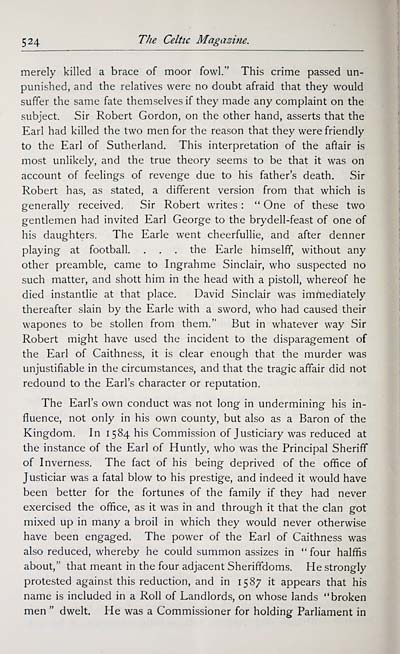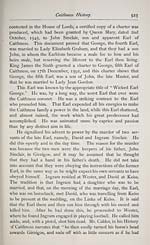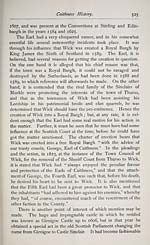Blair Collection > Celtic magazine > Volume 12
(534)
Download files
Complete book:
Individual page:
Thumbnail gallery: Grid view | List view

524 The Celtic Magazine.
merely killed a brace of moor fowl." This crime passed un-
punished, and the relatives were no doubt afraid that they would
suffer the same fate themselves if they made any complaint on the
subject. Sir Robert Gordon, on the other hand, asserts that the
Earl had killed the two men for the reason that they were friendly
to the Earl of Sutherland. This interpretation of the affair is
most unlikely, and the true theory seems to be that it was on
account of feelings of revenge due to his father's death. Sir
Robert has, as stated, a different version from that which is
generally received. Sir Robert writes : " One of these two
gentlemen had invited Earl George to the brydell-feast of one of
his daughters. The Earle went cheerfullie, and after denner
playing at football. . . . the Earle himselff, without any
other preamble, came to Ingrahme Sinclair, who suspected no
such matter, and shott him in the head with a pistoll, whereof he
died instantlie at that place. David Sinclair was immediately
thereafter slain by the Earle with a sword, who had caused their
wapones to be stollen from them." But in whatever way Sir
Robert might have used the incident to the disparagement of
the Earl of Caithness, it is clear enough that the murder was
unjustifiable in the circumstances, and that the tragic affair did not
redound to the Earl's character or reputation.
The Earl's own conduct was not long in undermining his in-
fluence, not only in his own county, but also as a Baron of the
Kingdom. In 1584 his Commission of Justiciary was reduced at
the instance of the Earl of Huntly, who was the Principal Sheriff
of Inverness. The fact of his being deprived of the office of
Justiciar was a fatal blow to his prestige, and indeed it would have
been better for the fortunes of the family if they had never
exercised the office, as it was in and through it that the clan got
mixed up in many a broil in which they would never otherwise
have been engaged. The power of the Earl of Caithness was
also reduced, whereby he could summon assizes in " four halffis
about," that meant in the four adjacent Sheriffdoms. He strongly
protested against this reduction, and in 1587 it appears that his
name is included in a Roll of Landlords, on whose lands "broken
men " dwelt. He was a Commissioner for holding Parliament in
merely killed a brace of moor fowl." This crime passed un-
punished, and the relatives were no doubt afraid that they would
suffer the same fate themselves if they made any complaint on the
subject. Sir Robert Gordon, on the other hand, asserts that the
Earl had killed the two men for the reason that they were friendly
to the Earl of Sutherland. This interpretation of the affair is
most unlikely, and the true theory seems to be that it was on
account of feelings of revenge due to his father's death. Sir
Robert has, as stated, a different version from that which is
generally received. Sir Robert writes : " One of these two
gentlemen had invited Earl George to the brydell-feast of one of
his daughters. The Earle went cheerfullie, and after denner
playing at football. . . . the Earle himselff, without any
other preamble, came to Ingrahme Sinclair, who suspected no
such matter, and shott him in the head with a pistoll, whereof he
died instantlie at that place. David Sinclair was immediately
thereafter slain by the Earle with a sword, who had caused their
wapones to be stollen from them." But in whatever way Sir
Robert might have used the incident to the disparagement of
the Earl of Caithness, it is clear enough that the murder was
unjustifiable in the circumstances, and that the tragic affair did not
redound to the Earl's character or reputation.
The Earl's own conduct was not long in undermining his in-
fluence, not only in his own county, but also as a Baron of the
Kingdom. In 1584 his Commission of Justiciary was reduced at
the instance of the Earl of Huntly, who was the Principal Sheriff
of Inverness. The fact of his being deprived of the office of
Justiciar was a fatal blow to his prestige, and indeed it would have
been better for the fortunes of the family if they had never
exercised the office, as it was in and through it that the clan got
mixed up in many a broil in which they would never otherwise
have been engaged. The power of the Earl of Caithness was
also reduced, whereby he could summon assizes in " four halffis
about," that meant in the four adjacent Sheriffdoms. He strongly
protested against this reduction, and in 1587 it appears that his
name is included in a Roll of Landlords, on whose lands "broken
men " dwelt. He was a Commissioner for holding Parliament in
Set display mode to: Large image | Transcription
Images and transcriptions on this page, including medium image downloads, may be used under the Creative Commons Attribution 4.0 International Licence unless otherwise stated. ![]()
| Early Gaelic Book Collections > Blair Collection > Celtic magazine > Volume 12 > (534) |
|---|
| Permanent URL | https://digital.nls.uk/76466904 |
|---|
| Description | Volume XII, 1887. |
|---|---|
| Shelfmark | Blair.13 |
| Attribution and copyright: |
|
| Description | A selection of books from a collection of more than 500 titles, mostly on religious and literary topics. Also includes some material dealing with other Celtic languages and societies. Collection created towards the end of the 19th century by Lady Evelyn Stewart Murray. |
|---|
| Description | Selected items from five 'Special and Named Printed Collections'. Includes books in Gaelic and other Celtic languages, works about the Gaels, their languages, literature, culture and history. |
|---|

